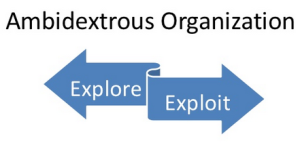 The typical linear and often siloed mindset that we have for much of our innovation thinking within our business organizations has to rapidly fall away.
The typical linear and often siloed mindset that we have for much of our innovation thinking within our business organizations has to rapidly fall away.
We are in the ‘cusp’ of a fundamental change that technology, platforms and connected ecosystems will bring into the mix for connecting and collaborating in dramatically different ways than in the past.
One of the implications will be our need in measuring the metrics within companies. The measurement of inputs, throughout and outputs need to become far more focused on delivering speed and scale potential as the critical points. We are far more needing to focus on the outcomes as our primary point of measurement.
This is a further post on discussing outcomes as the focal point of our innovation measurements, following my recent one of “Shifting to Ultimate Outcomes”
Recognizing the emergence of the outcome economy
The outcome economy which is emerging has many implications within it and how we measure and value these will become increasingly important. Companies will need better data to calculate costs, evaluate its potential value and will be modelling far more the risks and tracking the factors required to deliver within any outcome-based value promised.
Continue reading “The Connected Art of Selling Outcome-Based Solutions”

